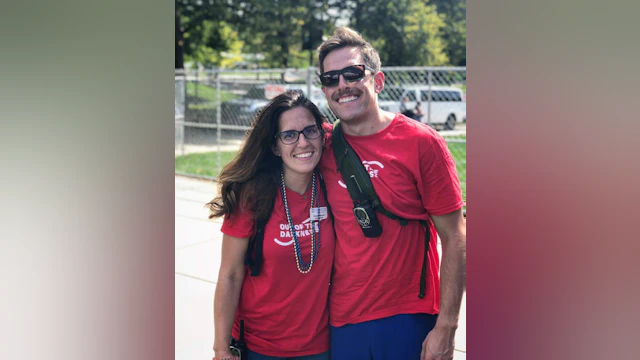Mar. 12, 2019 - I wasn’t supposed to carry my baby brother Sam around by myself. Instead, I craftily dragged him on a blanket into my room to play; our parents often found him in a laundry basket with me pushing him around to show him my stuffed animals.
I was two and a half when Sam was born. For the early part of his life, he probably thought his name was “My Baby,” because that’s what I called him. I was convinced he was my real life baby doll and I treated him as such. I took him everywhere with me and wanted him to be by me all the time.
Sam didn’t talk until he was about three. We had our own special language in which he would spew gibberish and I would interpret it for our parents, which really meant I interpreted it to be whatever I wanted.
As we grew older, we grew together. Many people assume we are twins, we look so much alike. He was at all my rugby matches in a protective stance on the sidelines. I was his obnoxious older sister banging on the glass at his hockey games. We cheered each other on through the darkest of times. Even though we are now both in our late 20s, our closeness has only strengthened.
Sam and I found the American Foundation for Suicide Prevention in 2016, over 13 years after we lost our dad to suicide. I had overheard a stranger talking about suicide prevention in a local coffee shop, and we quickly connected with our local chapter. Connecting with other loss survivors after such a long time of feeling alone was comforting. Sam and I both got involved with the planning committee for the Indianapolis Out of the Darkness Walk and other elements of the Indiana Chapter.
Through our new connection, we met people in various stages of their grief journeys. For some, it had been many years since their loss but they still felt it as a fresh pain. Some had recent losses and were in the more immediate “grief fog.”
I consider myself the queen of “feel your feelings.” I discovered that I was able to honor all of these people’s grief journeys. All except my brother’s.
Our chapter had hosted a Child & Teen Suicide Loss Bereavement Training, which I attended as staff support to make sure the day ran smoothly, but I also wanted to learn. One of the trainers said something that touched me at my core: “Quiet grief is not absent grief.” In that moment, I realized that I had not been honoring my brother’s grief journey.
Over the last 17 years of Sam and I navigating our lives together without our dad – and even the last four years, after becoming involved with AFSP – I often found myself getting frustrated with my bother. Sometimes it may have been because I needed his help for a volunteer event, and he wouldn’t come because he “needed to go for a bike ride.” More recently, I had been invited to give the keynote address at the Mental Health America Indiana gala. Nervous for my speech, I’d invited Sam to be my guest, but he’d told me he couldn’t attend because he was going to the climbing gym. He texted me good luck and told me he was proud of me before the event, but my feelings were hurt.
The next day, he asked me to read my speech to him. We cried and he shared with me that he wanted to be there to support me, but knew that hearing me talk about our dad and all we had been through would unpack some things he wasn’t ready for.
This experience, combined with what I was hearing in the training, made me realize that climbing and riding were part of his self-care.
Why was it that I could be so gentle and understanding with strangers, but with my own brother I had expectations of what his grief should look like and what his healing should feel like? We share the same loss, but how we process our experience is very different. After 17 years, I have finally realized that.
My biggest fear had been that Sam would be like our dad, and die young. He looks just like him, he’s funny just like him….might he die just like him? As his big sister, I saw it as my role to make sure he felt supported, encouraged, and loved. I needed to make sure he knew that he mattered and that I needed him here. I realize now that even with the best intentions, I was smothering him. I had interpreted the fact that he was not wearing his emotions on his sleeve as a sign that he was not dealing with his feelings.
But as I had just learned in the workshop, “quiet grief is not absent grief.” It wasn’t that Sam wasn’t grieving. It was that he was doing it his own way.
Now, on mornings when he says, “I can’t make it to the volunteer meeting,” I say, “Okay, I understand. If you want to talk I am here,” rather than lecturing him that he made a commitment.
I need to let my brother, the person I love the most and my very best friend from day one, “feel his feelings” without expectations. I need to honor and encourage his grief journey without stifling it and setting up unfair expectations.
I have seen so much growth in him. I have seen the little baby who didn’t talk until he was three grow into a man who has found his voice on his own terms, and in his own way.
We heal together, but differently.
To find your local AFSP chapter, click here.
To read Children, Teens, and Suicide Loss, written by AFSP in partnership with the Dougy Center, The National Center for Grieving Children & Families, click here.
